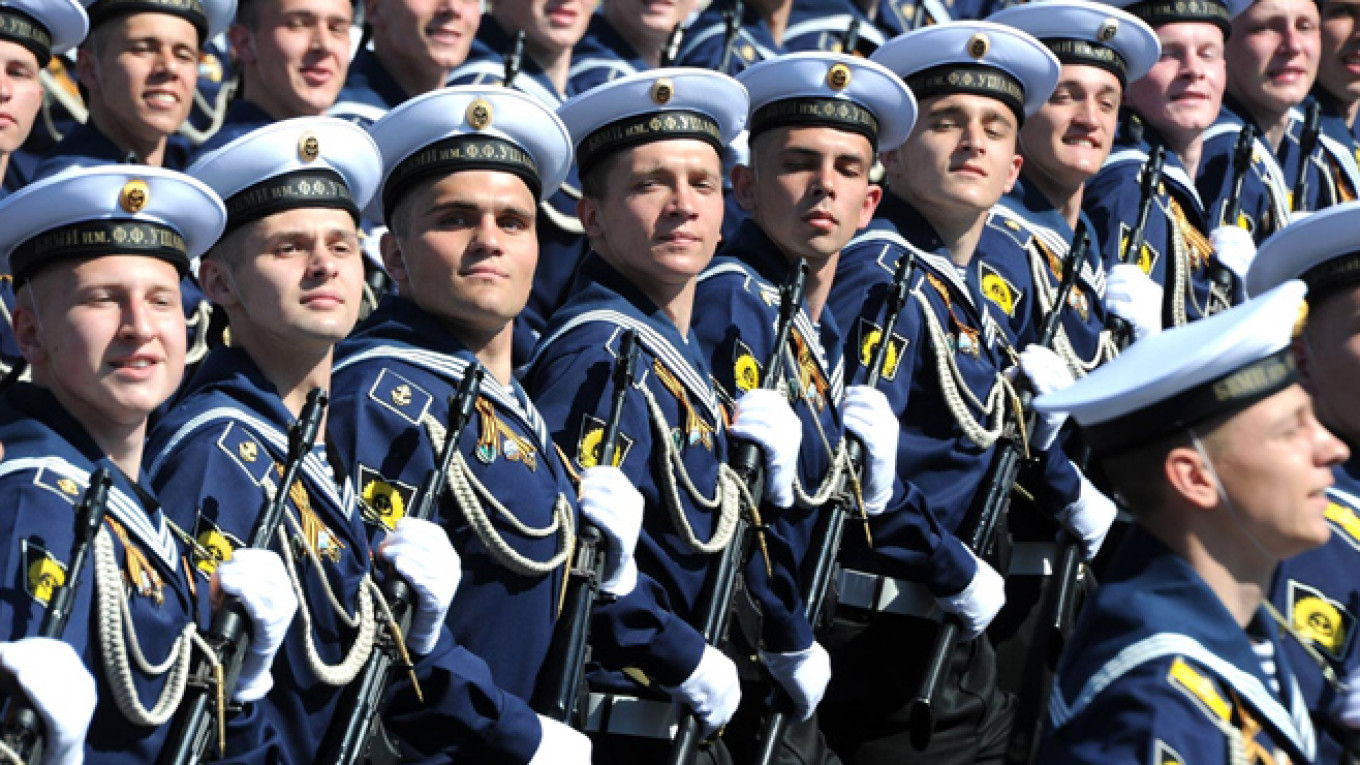Thousands of soldiers marched through Red Square on May 9 to commemorate the 71st anniversary of victory over Nazi Germany. Though not as ambitious as last year's 70th jubilee, this year's Victory Day parade was designed to showcase the growing importance of the Soviet victory in World War II — and that of Russian military force — in Russia's current global agenda.
The newly-created Military Space forces, the National Guard and female soldiers participated in the parade for the first time this year. Intercontinental ballistic missiles, 135 tanks and military vehicles, including Russia's newest S-400 anti-aircraft missile systems rolled through the city's streets and across the square. Seventy-one aircraft — including Sukhoi jets recently returned from Syria — flew overhead.
It has been six years since Russia's World War II allies — the United States, Britain and France — sent troops to march alongside the Russian military on Red Square and German Chancellor Angela Merkel stood on the podium with Russian leaders.
This would be hard to imagine today. After Russia's annexation of the Crimean Peninsula in 2014, Russia was expelled from the G8 and NATO has been increasing its military presence along Russian borders in Eastern Europe (see article, page 4), a move to deter Russia from moving forces into neighboring NATO states.
Western leaders were not invited to Red Square this year. In his annual address, President Vladimir Putin didn't mention Soviet allies, but said that Soviet soldiers were the ones to have brought freedom to other nations.
According to political analyst Yevgeny Minchenko, Putin's message was that the Russian nation could have ended the war all by itself, without its allies' help.
The only foreign leader to stand alongside Putin on Red Square was Kazakh President Nursultan Nazarbayev, who was treated as a true ally and special guest at the ceremonial reception in the Kremlin, following the parade. At the same reception, Putin said: "Victory is a formidable warning to those who would like to test our endurance. Victory in World War II demonstrated Russia's pride and readiness to defend the country's interests."
As if in accordance with such statements, Russian weapons were paraded through territories which have recently seen an intensified Russian military presence. The Russian Black Sea Fleet lined up in Sevastopol Bay, with dozens of armored vehicles and hardware joining nearby on Crimean territory. A smaller version of Moscow's parade took place on Russia's Khmeimim air base in Latakia, Syria, together with members of Syrian President Bashar Assad's army.
It was the first time in recent history that Russia's Victory Day parade expanded beyond its national borders. This was to demonstrate that, despite the economic crisis, Russia is more militarily competent than before, says Minchenko.
Victory Day remains the main national holiday, and, under the influence of state propaganda, its importance has only grown. Over the last two years, Russian propaganda has widely applied the World War II narrative to military developments in Ukraine. The new Ukrainian government has been compared to Nazi hit squads and portrayed as the direct political heirs of the Nazis' wartime cohorts in Ukraine.
Now, following such direction, Russians increasingly treat Victory Day as a source of glory, energy and guidance. The increasingly popular slogan "We can do it again," often seen plastered across car windows, refers back to Soviet victory in World War II, and forward to new tensions with the West.
However, when it comes to officially defining the enemy, the war narrative falls apart. In his speech on May 9, Putin said — in a somewhat contradictory manner, according to Minchenko — the new enemy, or "new Nazism," is not the West, but the global threat of terror.
In order to fight terrorism, Putin says, Russia is ready to unite efforts with all nations to "form a modern, non-aligned system of global security."
In fact, rhetorically, the Kremlin is not pushing forward, but retreating from its recent aggressive anti-Western stance, says political analyst Vladimir Frolov. The West has been invited to cooperate, but the offer is so vague that it will most certainly fail to garner a response. "Though areas of real cooperation do exist, the Kremlin doesn't give a hint — as if intentionally —? what form this new security system could take in practice," says Frolov.
But the message — which looks ambiguous and amorphous to Western onlookers and policy-makers — is understood clearly within Russia: Russia is ready to use force against its enemy, wherever such an enemy may be. "We protected our country against Nazism before. Now we will protect it against extremism," reads a banner on a Moscow bus, as though there is hardly any difference between the two. The banner does not state that under Russian law, almost any controversial or remonstrative observation can be treated as extremism. That's understood.
Contact the author at m.fishman@imedia.ru


